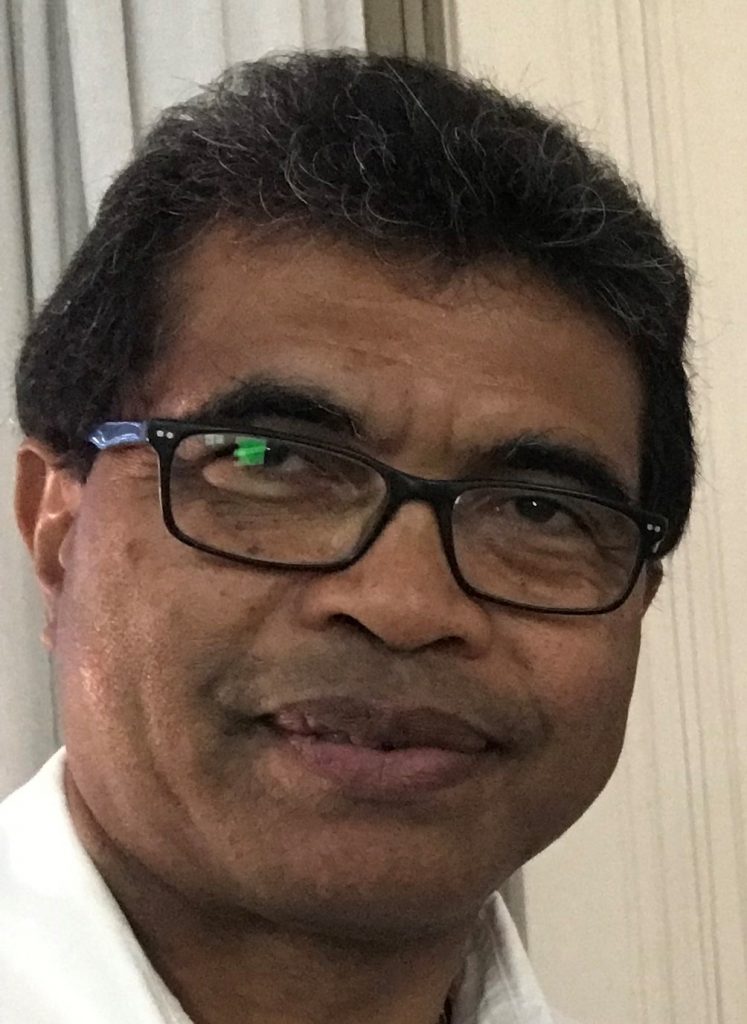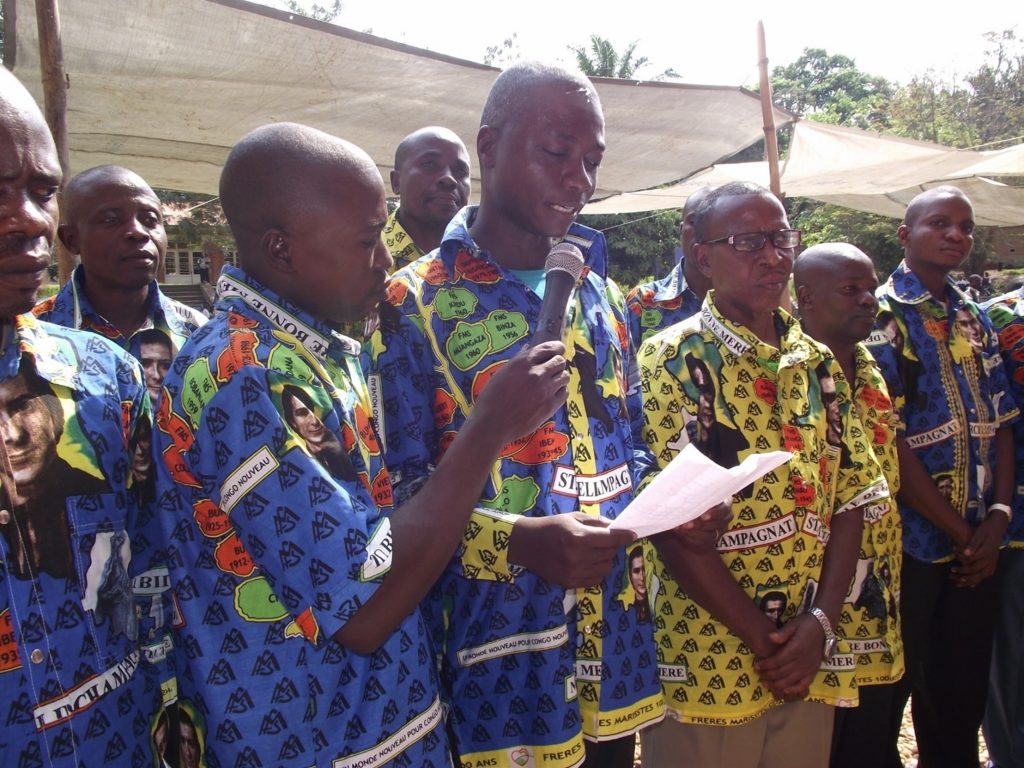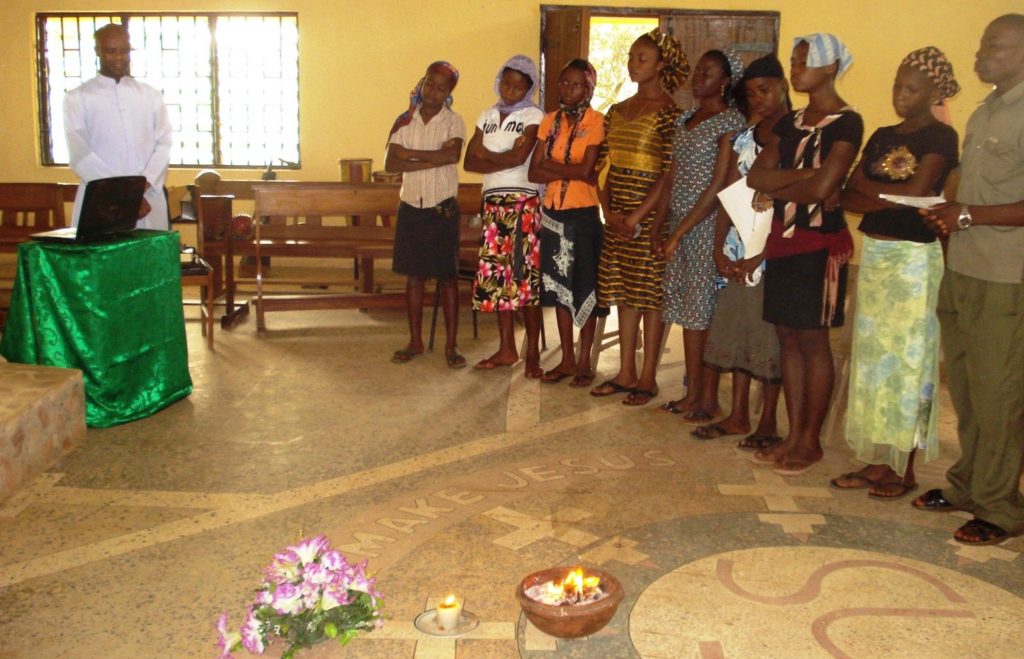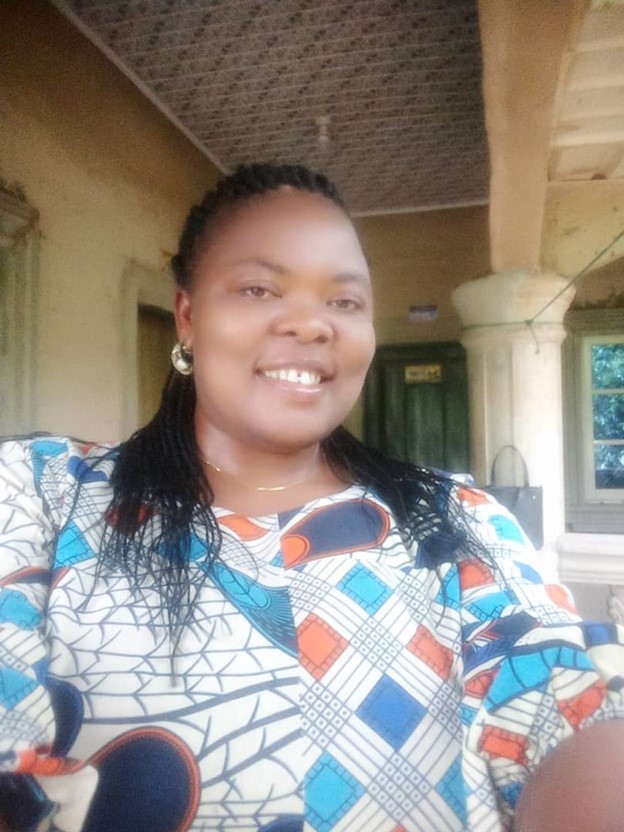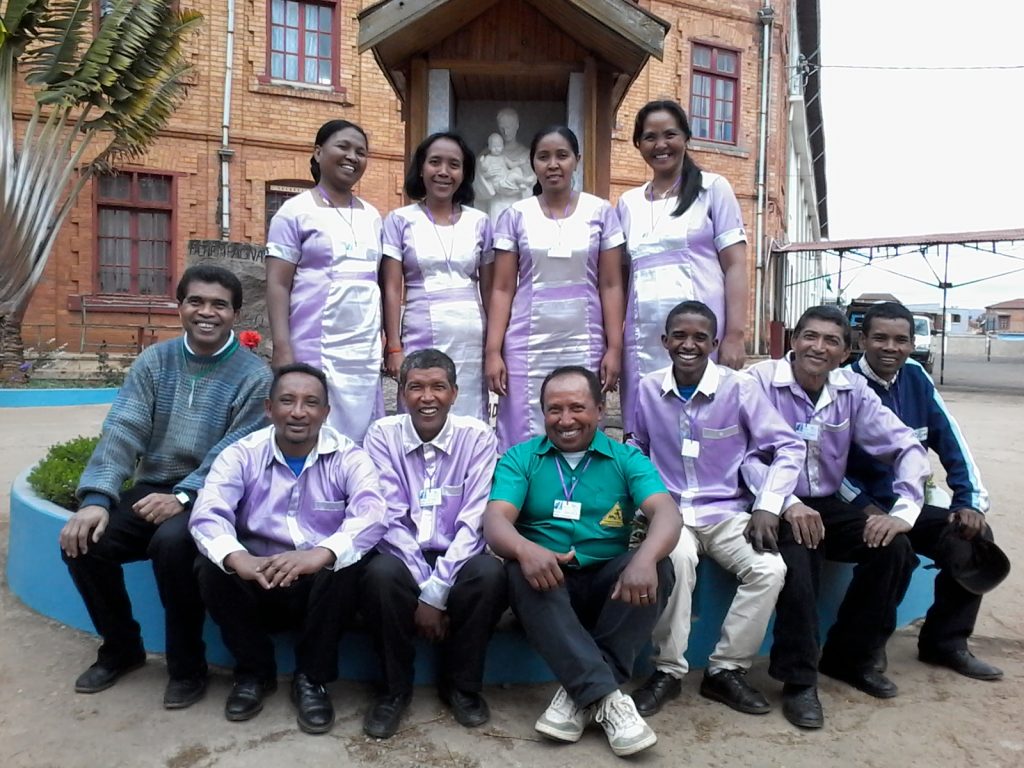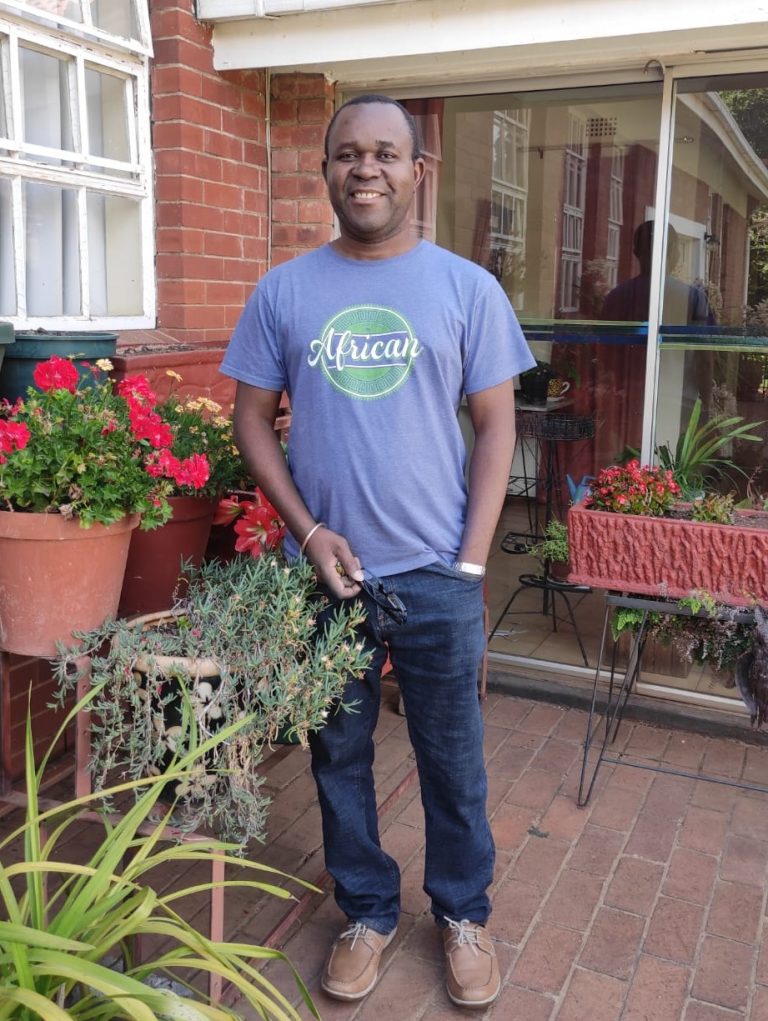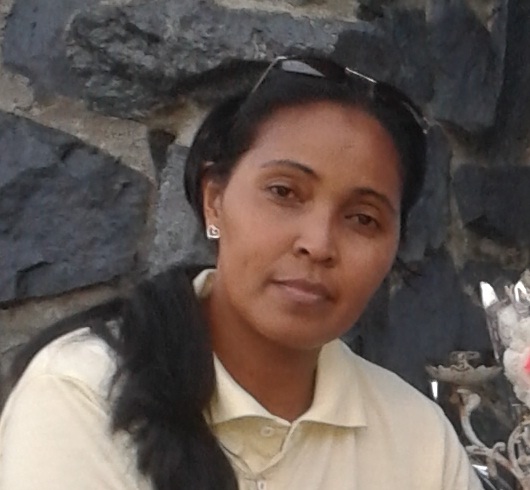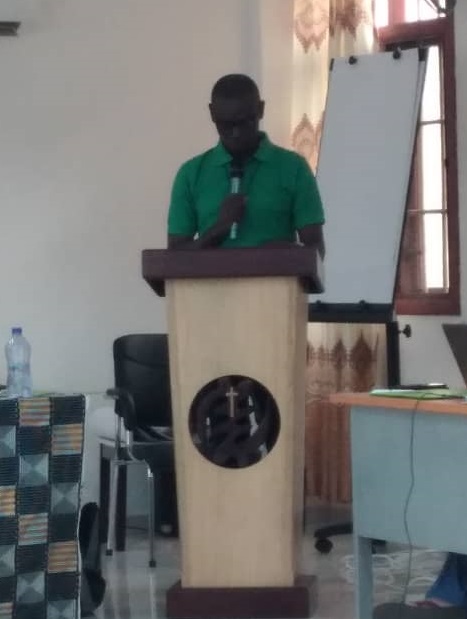Sharing 7- The Lay Marist Vocation
Sharing. The Lay Marist Vocation (Lay Marist Newsletter)
PDF: English | Español | Français | Português
Living together
Sylvain Ramandimbiarisoa – Councillor General
God created man to live with others: “God said, “It is not good for the man to be alone. I will make a helper corresponding to him” (Gen 2:18). Jesus prayed to his Father: “May they all be one, as you, Father, are in me and I am in you. May they also be in us, so that the world may believe you sent me” (Jn 17:21). We are created to live together and be in communion. Jesus himself gave us a law that sums up all the commandments: “Love one another. Just as I have loved you, you are also to love one another” (Jn 13:34). As Christians, this is the basis of our conduct, and we bear witness to it in the world. “I do not ask you to take them out of the world, but to keep them from evil… As you sent me into the world, so I have sent them into the world.” (Jn 15:18). It is through love that we bear witness to the fact that we live communion among ourselves.
In Africa, living together, living as a community, is natural. People meet under a tree to talk and share. In the tradition of Madagascar, there is the “takariva amorom-patana“; that is to say, in the evening, the family meets around the fire to tell stories, share riddles, proverbs and other ways of transmitting messages, which is our way of educating the children.
In terms of work, the “atero ka alao” is when a family must plough its rice field or transplant rice or harvest… the whole village collaborates in this work, helping each family in its turn.
The “fihavanana” is a Malagasy mentality. It is lived with the feeling of being part of the same family. Therefore, those who are dispersed in the world always have the tendency to meet again, to always renew this “fihavanana“.
In Africa, we live the “UBUNTU“, which is a humanistic notion from the South of Africa that could be translated as “I am what I am thanks to what we all are“. This means that our personal existence depends on the group, I cannot exist alone.
Many African and Malagasy proverbs show this value of collaboration and community.
- “If you want to go fast, go alone. If you want to go far, go together.
- “If we get together, we can carry an elephant” (words of the ants),
- “Better to lose money than to lose fihavanana”
- “Ny firaisan-kina no hery”: Union makes strength.
- “Ny mita be tsy lanin’ny mamba”: If we Cross the river together, the crocodile will not attack.
- “Taotrano tsy efan’ny irery”: Alone you can’t build your house!
Although we have lost these traditional values, some of them remain.
Africa is influenced by the consequences of colonization. At present, this continent is in transition, torn between its own tradition and the influences of the West. However, it cannot remain isolated; it must widen the circle of its life in all domains. It must not exclude itself from the globalization. However, there is the challenge of keeping certain traditional values.
It is in this context that the Marists in Africa live.
Marist life in Africa
Africa is the youngest continent in the world. In nearly 40 African countries, more than half of the population is under 20 years of age. (See World Population Prospects). In Africa we see children everywhere! There are never enough schools to educate the children. The Marists in Africa live in this context. This influences the mentality and the vocation.
In Africa, we still have many vocations of Marist Brothers. This year, twenty Marist novices from the Marist International Novitiate in Kumasi, Ghana, made their first profession. More precisely, this year in Africa there are 27 novices, and the total number of Brothers is 463.
Probably because of this, there are Brothers who have a certain reluctance to welcome the Marist Lay Vocation. In fact, they think that other continents insist on the importance of the lay vocation because of the lack of religious vocation. It is still a challenge to change this way of thinking and to be open to the laity vocation. For the promotion of the lay vocation does not depend on the number the Religious Brothers. Since Vatican II, the vocation of the laity has been encouraged in the Church. Moreover, especially since the canonization of Marcellin Champagnat, his charism is not exclusively for Marist Brothers, it is a charism within the Church. All are invited to live the charism of Marcellin Champagnat!
Another possible reason for this reluctance is the situation of poverty in Africa. A majority of the population live on the bare necessities and find it difficult to survive. Therefore, entrusting important responsibilities to the laity is still difficult. On the other hand, the laity themselves find it difficult to pay contributions for the activities to be done as a group. It is difficult to offer financial contributions, to travel, to pay for accommodation outside the home, etc.
Given this context, and other possible factors, the Marist Lay Vocation in Africa is only at its beginning.
However, we can see a lot of enthusiasm among the laity who are interested in the charism of Marcellin Champagnat.
Many lay people who are close to the Marist Brothers say, “I am a Marist”. What does that mean? Here there is a confusion between the collaborators of the Marist Brothers, the former students, the families of the Brothers, the groups of “Lay Marists” and perhaps other groups? All are proud to say “I am a Marist”. Who are the Lay Marists? This is another difficult question to answer.
A formation itinerary for the Marist Lay vocation is not yet well established. We are still in the process of trying to figure out how best to establish it.
Activities of Marist Lay and other Marist groups in PACE
Br. Valentin DJAWU – Provincial animation for Marist lay PACE Province
Here is a brief communication on the activities of lay Marists and other Marist groups in the Province of PACE. In our Province, I am not sure about the groups that qualify as “Marist Lay”. Here, there is a Lay group that underwent an initiation formation and its members made an act of commitment. Since then, this group continues its activities in collaboration with the Brothers, formators of the Postulancy and working in the Secondary School in Mwanza, Tanzania. This group was inaugurated officially on June 7th, 2009.
The specificity of this group is that it was born in a different context compared to other groups of Marist lay in PACE. That is to say, most groups are born in the environment of educational work (Schools or Universities). While this group was born around a formation house. This means that, we Marist Brothers, from our way of living, of communicating and being in dialogue with people we meet outside the community, we can attract or prevent lay people to discover who we are and our mission. It all started through my contact with Mama Mukasa. She is an executive of the post office in Mwanza town. With her, we launched a press release to the church inviting everyone who wish to become a ” Marist Lay “.
What is amazing about this group is that from its beginning, it actively contributed to the drafting of the Circular “Around the same table”. They translated the Statutes of the Champagnat Movement of the Marist family into Swahili. Swahili is the national language and one of the official languages of Tanzania. It is the language commonly spoken in the country, even in offices. This group actively participated in the first Provincial Assembly of PACE and contributed substantially in the commissions where they were appointed in relation to other lay people.
Another group which I can speak of in PACE is the the Marist Alumni Association (former students) of the Marist Brothers in DR Congo in general, but particularly, those of the Weza Institute in Nyangezi, followed by those of the Enano Institute in Kindu and those of the Bobokoli Institute in Kinshasa. The former students of Nyangezi stood out for their attachment to the Brothers and to the Marist works. As a proof of this attachment, they recently donated 100 desks to the Weza School Group. Thanks to one of them, the old and abandoned buildings of the Weza Institute were rehabilitated and transformed into agroveterinary school. In the spirit of solidarity the Marists, both Brothers and Lay collaborated in pig projects that aimed at helping others. They also donated an overhead projector to the Marist University of Congo. The Chairman of the Weza Alumni association, given their attachment to the Congregation, was invited to participate in the VI Provincial Chapter of PACE. Here are some photos attached.
From my experience, the lay Marists vocation in PACE still has difficulties to take root. I have the impression that the Brothers are overloaded by many tasks to fulfil in their apostolate and communities. Consequently, they do not have enough time to dedicate and deal with the animation of the vocation of the laity. I believe that if the Lay people themselves will not take the lead in their own formation, will not take care of their vocation; we will not have a strong Marist lay group in all the communities and works of the province of PACE.
My experiences as Marist of Champagnat
Br. Elias Iwu Odinaka – Province of Nigeria, Coordinator African Lay & Brothers Commission
Member of The Extended Secretariat of The Laity
As a typical African child, I was born and brought up in a family of six, five boys and a girl with strict adherence to the law and norms of the society. I found myself searching for the truth and light which led me to join the Marist Brothers of the Schools and I made my first Religious Profession in June, 2001.
In May, 2005, I completed my Scholasticate in Marist International Centre, Nairobi, Kenya and returned back to my country. I was assigned to be the Secretary of the newly formed Commission in my Province named Identity/Laity Commission. A responsibility I cherished and embraced with all my heart.
As a person who passed through Postulancy, Novitiate, Scholasticate and trained in Marist Spiritual Patrimony, my experience of Marist African Laity reminds me that of Champagnat and his first disciples. There is constant quest and desire to search for the truth and for answer. The sense of commitment, belonging, responsibility, solidarity, sharing, respect, mutual understanding and fear of God are embedded in the norms of the society.
However, there is this fear of unknown which in a positive manner propels the Marist African Laity amidst very difficult challenges such as government policies, limited resources, poor road network, poor network communication and inadequate human resources to mention but a few, make them more resilient bearing witness to gospel.
In 2013, with the help of the Extended Secretariat of the Laity, we founded the African Lay and Brothers Commission in Nairobi with a representative from the five Administrative Units in Africa (AU’s) which comprises District of West Africa (now Province of West Africa), PACE, Nigeria, Madagascar and Southern Africa.
African Lay and Brothers Commission
Looking to the future, Marist in Africa will live the charism of St Marcellin Champagnat by nurturing the existing trust and goodwill between Brothers and Lay people. We will work side by side to make Jesus known and loved by sharing the stewardship entrusted to us. The people of Africa will see the united face of a family bound by a single vision in our mission.
The objective of the Commission is to promote Formation for Brothers, for Lay Marist and shared formation to develop a new relationship and understanding of Lay Marist Vocation. Also, to identify opportunities in each AU of increased sharing and collaboration between Lay Marist and Brothers to nurture our co-responsibility for Marist Charism. Other objective is to mobilize and share financial, material and human resources.
What attracts me to Lay Marist
Ezeani Maureen Azuka – Province of Nigeria
I came in contact with the Marist Brothers in 2010 as an English Language teacher in one of their schools in Nigeria- Marist Comprehensive College Nteje, Anambra State.
Though I came as a classroom teacher who is supposed to deliver her lessons and go home, there is something very special about Marist Brothers that made me like their lifestyle which I did not experience in other organizations I have worked in, and that is the life of prayer and humility (Marian Life).
I love everything about Mary, and the way in which the Brothers relate to her. This singular love of Mary and the simplicity of life ensure I feel at home with the brothers. In fact, Marist was my second home those days. Everything about spiritual growth was readily available.
“Shared life” as a “global family”
Sylvain Ramandimbiarisoa – Councilor General
“Living together” starts in the family. “This is why a man leaves his father and mother and bonds with his wife, and they become one flesh” (Gen 2:24). The love and union between father and mother are the source of human life. Family life is the beginning of all social life. It is in the family that we learn to live with others.
Love, affinity is naturally lived in the family. Indeed, the members of the family are linked by the same vital flow. We “are” family because we are “born” together (Serge Vallon, 2006). Eventually this extends to the outside and finally we live in society.
The African context described above (Fihavanana, Ubuntu, etc.), favors the sharing of life. Africans are naturally driven to live with others. We share life in the nucleus of a natural family. We feel comfortable with those of the same culture. However, we also share life with other groups.
As Marists, we share life, and we “journey together as a global family”. Chapter 3 of the document, “Around the Same Table”, explains life shared between Brothers and Lay Marists but also life shared within each group. We can continue here with some reflections. How can we encourage the sharing of life and eventually live in “communion”? What are the challenges to be faced?
Given the large size of the society, and the variety of differences that exist, living together, collaborating, living in community and communion are not obvious. Facing the differences in society is a challenge that must be faced.
As Marists, we are part of this society. The Marist world is made up of many countries, with a variety of cultures and customs. Each one feels comfortable in his or her own group and must make a lot of effort to fit in with another group.
The religious Marist Brothers live in community. Normally the Brothers feel at home in their community. However, this is not a given. There are communities with many conflicts and difficulties of relationship, precisely because of the differences.
Marist collaborators live and work together in the context of work, school, a social work center or other forms of mission.
The Lay Marists feel called to live the charism of Champagnat, in addition to collaborating with the Brothers. They organize themselves in fraternities where they meet regularly to share life.
Normally, people with a certain affinity find themselves in the same fraternity and they are comfortable there. Otherwise, living together is not always easy.
Faced with these challenges of living together, we are called to journey as a global family. The context of globalization is not only in the Marist world. It is a worldwide reality in all areas.
We all know that the advanced development of technology has made communication easier. In terms of transportation, it has made national and international travel easier. As a result, people around the world can physically meet whenever they want.
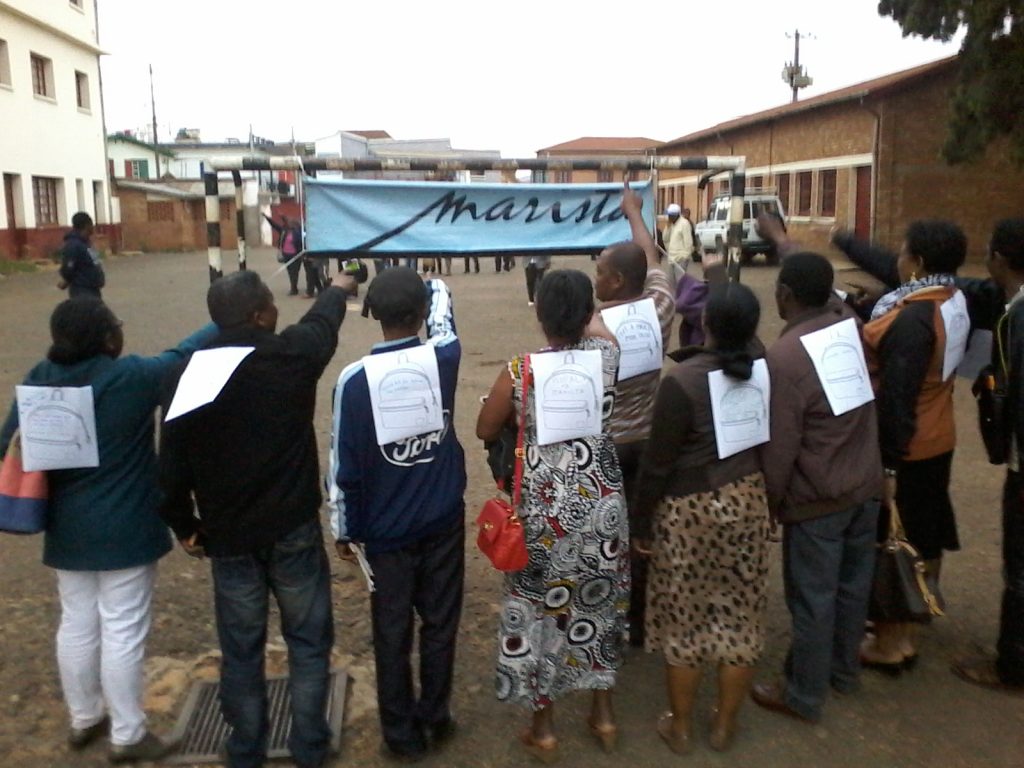
In terms of communication, news, information and advertisements circulate instantly. For example: the whole world can experience a football match together, friends can always stay in touch, meetings can be held online, etc. One of the negative consequences is that a virus, such as covid- 19, can be transmitted rapidly and become a global pandemic. Thus the whole world lives together good and bad.
At present, we are welcoming a new mentality that is more open, that is no longer limited to where we are. An openness that is lived at all levels: political, economic, social, and also ecclesial.
Religious congregations are creating structures to meet and collaborate. For example, in Africa we have SECAM (Conference of African Bishops), COSMAM (Conference of Major Superiors of Africa), UISG (Union of Superiors General), etc. Pope Francis speaks of a new perspective in his social encyclical, “Tutti fratelli“. He insists on justice and peace in the world. This should be the fruit of the contribution of all humanity, together. All must avoid war and acquire a global mentality that goes beyond differences.
As Marists, we are invited to follow the same line. As St. Paul says: “There is no longer Jew or Greek, there is no longer slave or free, there is no longer male or female; for you are all one in Christ Jesus” (Gal 3:28). Let us also go beyond the limits of our communities, our provinces, our regions and let us journey together as a global family. May we say that there is no longer Brothers or Laypeople, nor Marists of this Province or that Province… for we are all Marists of Champagnat.
To arrive at this new way of being Marist, we must dare to go beyond our egocentrism and fear of others. Pope Francis speaks of “global indifference”. We must acquire this new attitude, not to remain locked in our own interests and ways of seeing, but to be open and accepting the expectations and habits of others. We value our own culture, but we must also be interested in other cultures. We are used to managing and using our own resources, but we must learn to be generous in sharing our resources with others and pooling our goods. We start with a centralization of goods at the provincial level and then at the regional and global level. We can follow the example of the early Christians: “All who believed were in the same place, and they had everything in common. They sold their possessions and goods, and shared the proceeds among all, according to each one’s needs”. (Acts 2:44-45)
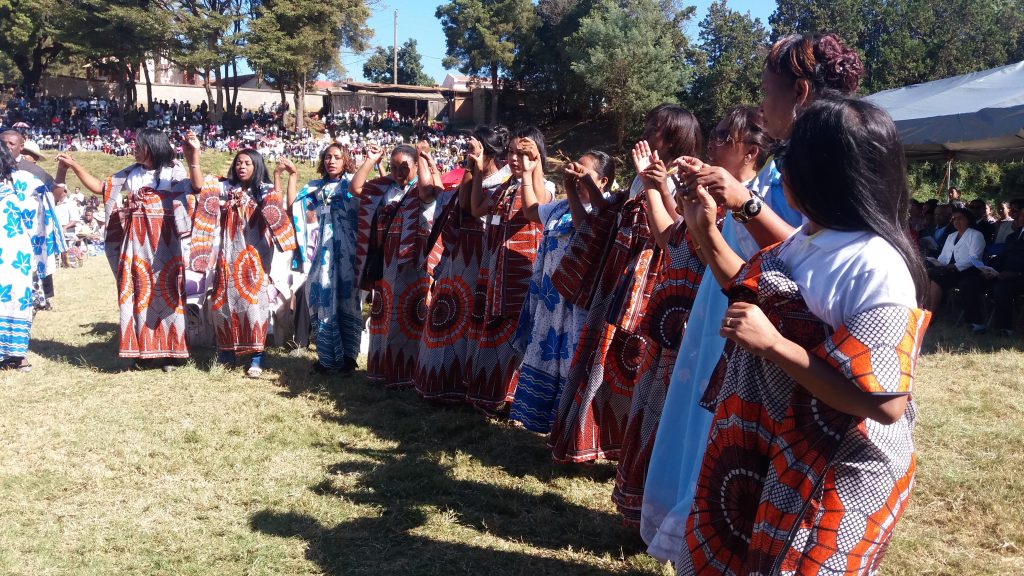
At the mission level, let’s create structures that promote global collaboration. There are strategies that can be used such as networks in certain areas. Examples are the networks of Marist schools, universities, youth ministries, printing houses, etc.
New technology strategies help us to connect and feel part of one family. We can use mass media like e-mail, internet, websites, Facebook, whatsapp, etc.
In short, it is a new mentality that we want to acquire; it is a question of feeling that we are members of one family at the world level, and therefore going beyond the feeling of being members of a province. In this way we could make Christ’s prayer come true: “that all may be one” (Jn 17:21).
This union starts with a small group and gradually expands.
As Marists, let us remain united, share life, and ” journey together as a global family “.
“There is not only a place for both at the table”
Br. John Bwanali – Southern Africa, Malawi
There is a question which always disturbs my heart when I hear it especially when we have gatherings discussing or sharing about Marist Laity. In our search for understanding about the Marist Lay Vocation, I have often encountered questions like: does working in a Marist Institution guarantee that one is a lay Marist? How does one become a lay Marist? This drives of course to who is a lay Marist?
I have participated from a distance both in discussions and sharing on such ideas until recently when I find myself at the heart of that same discussion as the coordinator of Marist Laity activities in my Province. I am very sure you sympathize with me, and you can imagine what went through me. I identified very much with a participant and contributor in the Water from the Rock who wrote:
“ I sometimes have the sensation of belonging to the Marist world because the Brothers have allowed me, and that I should be grateful for how much they have given me, while this is partly true, I would like to be recognized as Marist by my own choice and because I feel Marist and Lay by vocation; to be co-responsible in what it means to be Marist as an equal, to a participant in the same spirituality and mission from a different state of life” (Spain, Marist of Champagnat)
Taking time through the documents of the institute and the church, I realize that as baptized Christians, we are already one in Christ (Gal 3:28). There is no inequality on any basis: gender, nationality, race etc. The call to holiness is universal and we all have the responsibility to proclaim the kingdom of God.
The vocation of Lay Marist is a new expression of the charism of Champagnat. Therefore, we can only understand it in communion with the Institute of the Brothers, the original form of the charism and source from which we have discovered the treasure of our identity. (Water from the Rock, 124)
A deeper reflection on how one becomes a Marist is that there are a variety of ways. Many people come in contact with the Marist Brothers as students, educators, parents or friends. Through such encounters, they experience a call from God to live the charism of Champagnat without changing their state of life. Many persons are still unaware of their own Christian vocation or situation has made them passive participants, but this is our duty to help them discover it and respond with a yes as Mary did.
I, therefore, fully agree with the following passage from Water from the Rock: “The communion between lay people and Brothers complements and enriches our specific vocations and different states of life. There is not only a place for both at the table, but we need each other at our side.” (79).
My lay marist experiences
Alida Henri Bodomanitra – Province of Madagascar
I am married and we have 3 boys. I was looking for a job and I was accepted to teach in a Marist school. That is how I met the Marists for the first time. Now I teach in another Marist school, and I am asked also to oversee the primary section of this school. It is there that I start to know about St Marcellin Champagnat. There was a Brother who talked about the Marist charism. I was touched to hear about their charism especially the simplicity of life and to follow Christ as Mary did. I am really attracted by the Marial devotion. Now I know that to be Marist is to make Jesus known and loved. As I teach catechism in the Parish and in the school, I can do this Marist mission.
The story of Montagne motivates me more for this mission. I was so interested in Marist life, and I was sent to follow the course on “Lay Marist animation” in Rome in 2015. From that moment l was asked to be in charge of the Lay Marists in Madagascar. Later, I was asked to be part of the “African Lay and Brothers Commission”. Overseeing Lay Marist in Madagascar, I had to travel to meet the different groups in different places. This helped me to have wider awareness of Marist life. My experience in Rome during formation gave me opportunity to meet people from different part of Marist World. This increased in me the desire and motivation to go deeper in Marist life. This was also increased through my contact with people in Africa as I started my responsibility in the African Lay and Brothers Commission.
The pandemic is a worldwide situation, for us it was a cause of many difficulties in Lay animation. We hope that this will be resolved soon, and a new dynamic will start in the Marist World. I hope for a better communion among Brothers and Lay Marists. For us in Madagascar, the visit of external Lay Marists from other regions improved our Lay Marist life and gave us more motivation and dynamism. We wish that such visits will continue.
Marist Lay & Brothers Commission
Samuel Adu-Nontwiri – West Africa Province, Ghana
As a former teacher and a building expert, I feel awesome to belong to this great mission of the Marists of Champagnat. When my Provincial, Brother Cyprian Gandeebo, gave me a wooden Marist cross (crucifix), I was so delighted and said to myself, I have to go the extra mile to augment whatever I am doing for myself in the mission of the Marists of Champagnat.
As a legionary, who made hospital visits as an apostolate, little did I know God was calling me to the Marist mission. It was a Reverend sister who told me about the Marist Brothers. I looked for them and I admired their mission: working with the youth, especially the marginalized. Then when I got closer, I saw that their humility, their simple lifestyle, and their spirituality was fantastic. More so, Mary their Good Mother was the Mary of the Legionaries. The similarities brought me closer and I joined the Champagnat Movement of the Marist Family in the early 1990s. When I came closer, I admired their lives: at the table, they shared their day’s activities, experiences and advice themself as what to do going forward.
I also started reading some literature about the Marist Brothers and the Lay Marists from the internet. Sometime later, I decided to join the Lay Marist. At the beginning, the coordinator, Br. John Kusi Mensah, invited me with a few people who showed commitment to join. I felt deeply interested to join the group and I said to myself that I will do everything to be a Marists of Champagnat. This desire made me to tell the former District Superior, Br. Francis Lukong, that he could send me for a mission in any part of the Marist World. I made the same request to the current Provincial, Br. Cyprian Gandeebo, that I am ready for any work he wants to assign me. I have always admired the spirituality and their mission to the youth. I have always longed and dreamed to be a missionary in any part of the Marist world.
On the basis of this, I accepted an invitation to the Marist mission in Liberia – Monrovia. After returning, I continued with my drive for vocations into the Marist religious life. I equally continued my other Marist contributions in the Marists Province of West Africa.
These experiences have taught me great lessons on how to live with others and also show an exemplary life for others to emulate.
International Forum of Marist Laity
Raúl Amaya Rivera – Director of the Secretariat of the Laity
First phases of Stage II
“He began to walk with them” (Lk 24, 15).
In July 2021, Stage II of our International Forum began, which emphasizes reflection meetings at the local and AU levels. This stage includes the study and reflection, at the personal and community levels, of the proposed themes arising from the four objectives of the Forum.
To support the dialogue of the communities, the Extended Secretariat of the Laity has prepared a set of worksheets for the meetings, which touch on each of the objectives of the Forum, with the intention of generating reflection and dialogue among all the lay people and brothers involved in this process and to formally welcome their opinions and contributions to the Forum.
The process is being run in small groups made up of brothers, mixed communities, vocational lay men and women, fraternities of the MCHFM or other movements. It is being done in-person, where possible, or virtually. Although each Administrative Unit is organizing this stage according to its possibilities, they are trying to follow this scheme:
- Publicize the proposal (July 2021)
- Generate small group dialogues (July 2021 to May 2022)
- Select 3 representatives (July 2021 to May 2022)
- Hold Provincial/District Forum (March 2022 to May 2022)
- Submit AU conclusions (by June 30, 2022)
By June 30, 2022, the provincial Lay Animation Teams will send to the Secretariat of the Laity the final documents containing the results of the local and provincial/district process and the representatives.
We are grateful for the enthusiasm and hope that everyone is putting into this process of community dialogues; and we encourage you to continue on this path that will lead us, with the help of the Holy Spirit, to strengthen our Charismatic Family.

